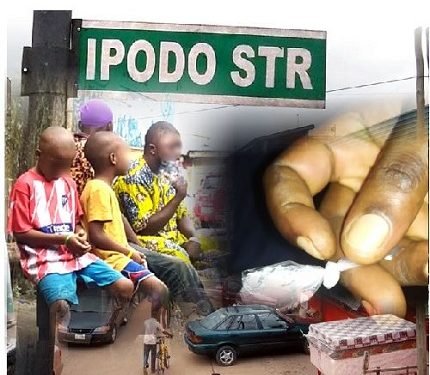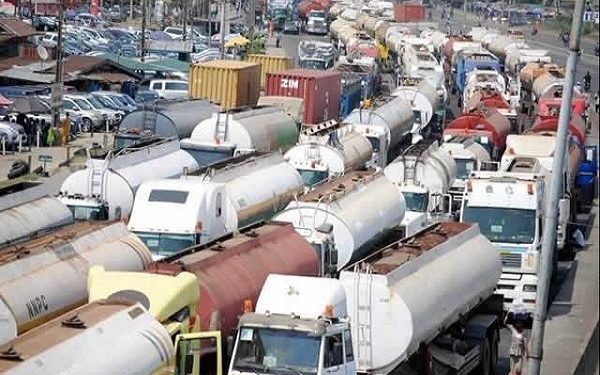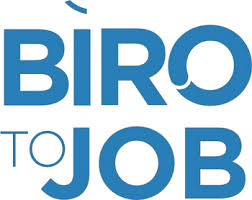IPODO…Where Drug Dealers Harvest Pleasure, Profit From Little Girls’ Bodies – The Nation

At our first encounter, she sashayed, flailing like a rag doll bound in an extremely tight camisole and undersized skirt. Happiness hustled like a street-wise cougar. Striking a pose outside KO’s Gardens, a brothel, she canvassed for male customers promising to fulfill every fantasy and its fruits.
Soon after she emerged from her room with a customer, she sidled beside a a middle-aged man sipping beer at a table by the brothel’s entrance. Happiness sat beside him teasing him with a smile.
Sparse dialogue, crushing banality, you simply dismiss the likelihood of anything happening until she leaned in and reached for his member, tracing her fingers along its length “in search of the cap.”
Seguing from street pidgin to neat English, she said, “Na street sense na,” she said, bragging that no man could refuse her “magic fingers” and teen-hellcat poise.
“Some men are sick like that,” she segued to neater English. “Many of my customers pick me because I am a small girl and I am very good. But I know what I am doing. I hope to make enough money to buy my freedom and set up a small business,” she said.
Until then, Happiness will serve as a sex slave to O’ngbana because he “saved” her from the streets and took good care of her. For instance, at her arrival in Ipodo, he introduced her to a madame who gave her “hustle clothing” (skimpy wears) for free. He also negotiated on her behalf, an arrangement whereby she was exempted from paying the mandatory N3, 000 daily rent of the tiny room where she sleeps with customers for money.
O’ngbana’s relationship with her is, however, guided by street wisdom. He knows he could only sell a rock of crack once to a customer or hook the latter up with a dealer for a paltry commission – and that is subject to drug demand and availability.
But he profits off Happiness multiple times a day, by pimping her off to different customers, seven or eight times a day.
A small rock of adulterated cocaine aka crack sells at N500 to N1, 000. But O’ngbana pimps Happiness to customers at N1, 500 per romp – often called three or five minute ‘short time.’
Together with O’ngbana, the 14-year-old oils the wheels, and powers the chug chug of Ipodo’s narcotics sales engine and sex trafficking network. But teacher and student, pimp and sex worker, are mere fragments of the menacing underworld that controls and feeds Lagosians’ lust for hard drugs.
At our first encounter, Happiness confidently laid her hands on me, stating, “Come, let me blow your mind.” At our second encounter, she suggested that we doped on gbana (crack cocaine) promising to “bless” me with heavenly delight. “I will take you to celestial heights,” she said.
Asides hustling on the street and luring men into her dingy bed at KO’s Garden, a brothel, Happiness sells hard drugs to some of her customers. Sometimes, when business is hard, she requests a split in the cost of her sexual services, taking N1, 000 cash and between N500 to N1, 000 worth of crack. Officially, she declares N1, 500 as her earning on each customer, “But I often make more than that. Some pay me N2, 000, N3, 000. When I see complete mugu, I collect N5, 000 for short-time,” she said.
Invisible in plain sight
Happiness is simply one of several youths trapped in the rapture of hallucinogenic substances but ignored in plain sight by regulatory authorities. Between 2018 and 2019, nearly 15% of Nigeria’s adult population (around 14.3 million people) reported a “considerable level” of use of psychotropic drug substances, a rate much higher than the 2016 global average of 5.6% among adults.
The survey was led by the National Bureau of Statistics (NBS) and the Centre for Research and Information on Substance Abuse with technical support from the United Nations Office on Drugs and Crime (UNODC) and funding from the European Union.
It showed the highest levels of drug use was recorded among people aged between 25 to 39, with cannabis being the most widely used drug. Sedatives, heroin, cocaine and the non-medical use of prescription opioids were also noted. The survey excluded the use of tobacoo and alcohol.
It also excluded teenagers like Happiness mired in the stark wilderness of prostitution and the dangerous highs of crack cocaine.

seized by the NDLEA
Few people would forget in a hurry, the heartrending story of Lizzy, the 26-year-old with a dependence on crack cocaine until her rescue by Dr. Tony Rapu, the founder of Freedom Foundation, an anti-drug dependence non governmental organisation (NGO).
Lizzy said she had been taking crack cocaine and living with her captors for seven years before she was rescued by Rapu.
She explained that she developed a hankering for cocaine seven years ago, while smoking weed with her boyfriend. The latter, she said, eventually revealed to her that he had been mixing her wraps with cocaine to her surprise, but it was too late as she got addicted.
Extent of drug use by geopolitical zones
There is no gainsaying many a life has been destroyed amid the bowels and drug dens of Ipodo, where crack cocaine and heroin are fast becoming a teen addiction and a fancy addition to the now ubiquitous psychotropic potions like gutter juice, pamilerin, colorado and so on widely accessed by youths across Lagos.
Of the regions included in the NBS and UNODC study, Lagos and Oyo in the South-West recorded a higher past-year prevalence of drug use among the southern geopolitical zones (at range 13.8 per cent to 22.4 per cent) compared to the northern geopolitical zones (range 10 per cent-13.6 per cent).
With approximately 6.4 million people aged 15-64 residing in Lagos State, the estimated past year prevalence of any drug use in South-West zone was established as nearly twice the national prevalence – an estimated 22.4 per cent or 4.38 million people of the Lagos population aged 15-64 had used drugs in the past year.
How do hard drugs get to the streets of Lagos?
There are several ways of getting cocaine from South America to Europe via Lagos, West Africa. In the past, there had been three main hubs in West Africa for receipt and redistribution of the cocaine shipments: The northern hub, radiating from Guinea-Bissau, Guinea, The Gambia, and Senegal. The southern hub, centered on Nigeria, including Benin, Togo, and Ghana. And an eastern hub, encompassing Mali and parts of Mauritania, of particular use in receiving consignments by air.
Once in West Africa, the drugs proceed to Europe along a number of routes. In the past, traffickers relied on large mother ships that offloaded cocaine onto smaller coastal craft. Commercial air couriers can carry only small amounts, but their frequent use can offset this deficiency, and they also allow for great flexibility, moving drugs from any country in the region to any European destination.
Cocaine shipments can also be trafficked onward by sea or by land across the Sahara to North Africa, where they are flown to Europe in light aircraft or shuttled across the Mediterranean in go-fast boats. As with the Atlantic routes, all of these approaches are utilized in parallel, with the preferred technique and routing changing in response to law enforcement efforts.
Due to the free movement of people and goods throughout the Economic Community of West African States (ECOWAS) region, drugs are often routed through member states without the hindrances of border controls.
The drive from Lagos (Nigeria) through Cotonou (Benin) and Lome (Togo) to Accra (Ghana), for instance, is less than 500 km and can be completed in one day. Guinea- Bissau, one of the primary countries of ingress for cocaine, lacks commercial air links to the destination markets, and connections from Banjul (The Gambia) are not much better. As a result, most air couriers in the north depart from Dakar (Senegal) or Conakry (Guinea).

On arrival in Europe, the drugs may be sold to European or South American crime groups, or distributed through the extensive network of West Africans involved in retail cocaine distribution.
South American cocaine transiting West Africa, however, comes from all three source countries: Colombia, Peru, and Bolivia.
Setbacks in West Africa and the opportunities in Honduras after the 2009 coup led Venezuela-based traffickers to shift their attention to the US market. But if the flow from Venezuela has declined, where is West Africa getting its cocaine?
Brazil may be the answer, particularly for West African- owned shipments. Brazil has long been a source for Lusophone Guinea-Bissau but it has since become a source for countries throughout the region. The amount of cocaine trafficked to and through Brazil has increased remarkably in recent years, as reflected in growing seizure statistics.
Gbenga Mabo, the Director of Operations and Investigations of the National Drug Law Enforcement Agency (NDLEA) said in a recent interview that more than 80 per cent of the cocaine that comes into Nigeria comes from Brazil, through Highway 10.
He argued that because Brazil is surrounded by Peru, Bolivia, Chile and others, a lot of cocaine gets into the country, and a syndicate of Nigerians operating in Brazil smuggles the hard drug into Lagos.
Nigerians have long dominated commercial air couriering from Brazil: close to 90% of the mules arrested at the international airport in Sao Paulo report obtaining their cocaine from Nigerian groups.
According to liaison officers in Brazil, Nigerian groups organize up to 30% of the cocaine exports by ship or container from Santos, Brazil’s largest port, up from negligible levels a few years earlier. The Sao Paulo-based Nigerian groups are also responsible for a very large share of the postal shipments of cocaine leaving the country.
Amoo Kolawole, 51, for instance, got caught while trafficking cocaine from Lagos through Europe for a Nigerian syndicate. He was arrested while travelling by rail between Switzerland and France. The First Class graduate of Electrical/Electronic Engineering with a specialisation in Communications Control and Devices refused to embark on the mandatory National Youth Service Corps (NYSC) programme on graduation and instead chose to become a drug mule.
Speaking to The Nation at his base in London, he said, “Due to my desperation to travel out, I joined a bad crew. With their help, I started trafficking cocaine. I got caught trafficking cocaine at the frontier between Switzerland and France. I got caught on a train. I was taken to a hospital and the cocaine I ingested was discovered in me after they opened my stomach. I was very lucky because some of it had spilled into my stomach. Consequently, I spent three years in a French prison.”
A blizzard of seizures
Recently, the NDLEA seized a consignment of cocaine and heroin worth N30 billion at the Murtala Muhammed International Airport, in Lagos. The spokesman of the agency, Jonah Achema, revealed that the drugs were seized from Onyejegbu Ifesinachi Jennifer, a 33-year-old lady, who arrived Nigeria from Sao Paulo, Brazil.
According to him, the seizure weighing 26.840 kilograms is the biggest single seizure from an individual in the past 15 years. Achema said that the drugs were seized after she was searched in line with NDLEA protocol profiling passengers “from high risk countries”.

“Field test was conducted on the recovered substances and proved positive to cocaine and weighed 26.850 kilograms. The suspect who is a hair stylist and based in Brazil was interviewed and she confessed to have agreed to smuggle the hard drug for the sum of N2m only,” said Achema.
This development came on the heels of a similar one recorded two days earlier at the same airport, on January 25, 2021 when a red left-over luggage was declared to the NDLEA operatives as a left over at the E-Arrival hall after the inward clearance of passengers on Ethiopian airline.
Based on information on the luggage tag, the luggage arrived Nigeria from Sao Paulo, Brazil, a destination classified as high-risk country going by records and trends of arrest and seizures.
Subsequently, the NDLEA arrested suspects Abubakar Aliyu, Emmanuel Iyke Aniebonam, Onwurah Kelvin, while trying to retrieve the drugs on behalf of one Ikechukwu Eze.
The detained bag, which was opened in the presence all the three suspects, reportedly contained whitish powdery substances were discovered neatly concealed and sewn inside five children duvets.
Field test was carried out on the exhibits which proved they are cocaine weighing 8.400 Kilograms, with a street value of over N7bn.
Hard drug economics
As the prices paid for illicit drugs, and the profits to be made from them, are far higher in Europe and the US than in West Africa, large-scale traffickers generally seek to ship illicit drugs through the region to the international markets. However, in some cases low-level drug traffickers are paid in kind and lack the resources or networks to move the drugs across borders. Consequently, they flood the local market with illicit drugs, contributing to the growth in domestic consumption rates.
A spike in heroin and cocaine production since 2016 is the likely explanation for the increase in the volumes of each drug type transiting through Lagos and other parts of West Africa.
Following rudimentary economics of supply and demand, the increased supply of cocaine and heroin to the domestic markets in the region has led to falling prices and easier accessibility to the hard drugs.
For instance, in 2017, the price for one ‘hit’ of heroin or crack cocaine, was just over US$2.16
On average, cocaine users reported spending N 6,300 NGN (or 20 USD) per day on cocaine (N 7,000 by women or 22 USD spent per day). This amount is nearly half of the national minimum wage per month. Similarly methamphetamine users spent an average of N 4,000 (or USD 13) per day. The growing sophistication of drug-trafficking groups generally continues to outstrip the investigatory capacity of law-enforcement authorities. This has led a number of players in the international community involved in tackling the regional drug trade, together with members of the National Drug Law Enforcement Agency (NDLEA) and the police force, to predict that the situation will get worse before it gets better.
Taming the dragon
Recently, the Medical Director (MD) of the Federal Neuropsychiatric Hospital (FNPH), Yaba, Dr. Oluwayemi Ogun, raised the alarm over increasing prevalence of drug abused induced mental disorders among children, adolescent and adult Nigerians saying over 150 new cases are admitted at the hospital and its Child and Adolescent Centre, Oshodi Annexe every week.
Reacting to teen addiction to psychotropic substances, she said, in an exclusive interview with The Nation, that: “Codeine, cocaine, Indian Hemp, Tramadol and Rohypnol are seriously dangerous to health the way they are abused.”
She said, “There is need for a lot of counselling and education of the youths. They must be made to understand that taking psychotropic substances would have adverse effects on them and possibly wreck their lives. Since the lockdown, the number of people taking drugs has sky-rocketed. Many of them ended up as our patients at the psychiatric hospital. Troubled teenagers especially must understand that the good times are made, not sniffed, drunk or smoked.”
The senior psychiatrist urged parents, schools and religious groups to complement government’s efforts at combating the trend. “ We must act fast before this thing engulfs us… Many resort to hard drugs to escape their daily problems, to forget their battles with unemployment, poverty and so on. But hard drugs do not take away problems, they add to the problems and compound them for users,” she said.
Priscilla Benjamin-Olaoye, a mental health expert, stated that hard drugs only offer a temporary sensation. Once the drug wears off, individuals put themselves at risk of developing a dependence as they try to reach the same high and avoid withdrawals.
Should parents resort to spiritual homes or visit orthodox psychiatric hospitals?
Benjamin-Olaoye argued that although the first assumption to make is that drug addiction is a spiritual problem, substance abuse is actually a chronic relapsing disorder, leading to mental and behavioural challenges.
Arguably, a spiritual problem, she stressed, is one in which the individual has no control over, but “in this case, substance abuse is one which the individual behaves themselves into.”
You cannot pray yourself out of what you behaved yourself into, she argued, urging parents to implement a healthy balance of both. She said, “Don’t focus on the spiritual aspect, while the emotional needs of the child is left unmet.”
Priscilla-Olaoye could save her homily for parents like Corporal Martins. A random trip to Ipodo unfurled with confounding imagery of the Nigerian police officer. Through the muck and mayhem of the drug den, the fair-complexioned man engaged O’ngbana, among others, in a heated argument.

Martins, a self-confessed cannabis lover cut a curious picture lounging at a makeshift bar cum drug den with his twin sons. Although the latter are barely six-years old, he argued that he had done nothing wrong by bringing them to the drug den.
“It’s better I expose them to what I do. What’s the big deal about it? They can’t beat me. And I would rather they find out from me that I smoke ganja (cannabis) and not from someone else,” he said.
“Na only cigarette I no dey smoke again but I dey take ganja. If I dey work, I dey take ganja (I don’t smoke cigarette but I smoke cannabis. When I am at work, I smoke cannabis)” he stressed.
Martins dismissed warnings that bringing his five and six-year-old sons to the drug den might wreak dangerous influence on them arguing, “Why should I hide my vices from them while I train them? They will be the one to train me when I age,” he said to wild applause.
Captive in Ipodo
In Ipodo, everything whim merges as one, and a vileness runs through it all. The Ikeja suburb is a constellation of people prowling various phases of drug dependence.
Residents call it Lagos city’s open sore, a colony of society’s rejects steamy with lust and searing on the psyche like a blood-bursting blister.
Within and around the drug den subsists a thriving market, the shrill blare of passing vehicles, noise from the music shops, the natters and wild altercation of thrill seekers occasionally spoiling for a fight spurred by the infinite of tang of marijuana, ecstasy, crack cocaine and heroin.
Amid the chaos, Happiness makes a living as a sex slave and drug dealer, on the watch of a fierce madame, Ralph and O’ngbana.
A radiant captive in a dingy brothel, the 14-year-old sheds her innocence in the warrens of Ipodo. She sleeps with seven to eight men daily. Sometimes 10. Even so, she would not sleep at night. “Menacing, ill-smelling patrons” bang on her door, intruding her private space, to ravage her paling body, under her madame and O’ngbana’s eagle eyes, till the wee hours of the morning.
Speaking with The Nation, her voice occasionally flailed, leaving on the wind, a tinge of fatigue. To survive, she must strip to her bare flesh and work her supple behind to the bones, according to her patrons’ lustful wishes.
Her hidden graces unclothed, men old enough to be her father drool to her door, day and night, to maul and harvest womanly fruits from her girly frame. To survive their ravage, she cradles dreams of freedom and fairer tomorrow. These days, all that’s left are a mop of faith and a grain of will in her arid body. She is just 14.








